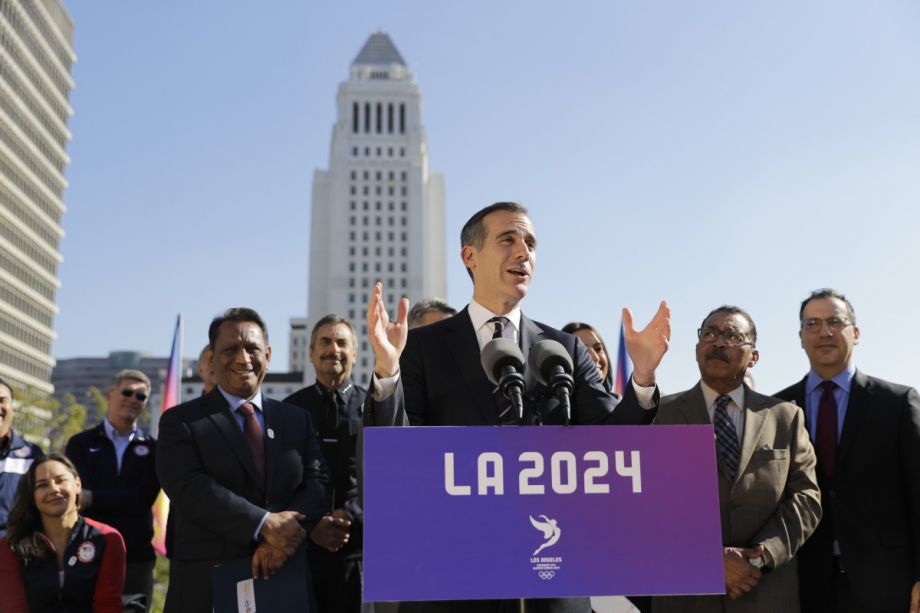Can the United States host a sustainable Olympics? That’s the question now that Los Angeles is on track to welcome the Summer Olympics in either 2024 or 2028. Los Angeles Mayor Eric Garcetti appeared arm in arm with Paris Mayor Anne Hidalgo and International Olympic Committee President Thomas Bach this week in Lausanne, Switzerland. The IOC announced it’s willing to award a future Summer Olympics to each of the two final 2024 bidder cities.
The move comes at a vulnerable moment for the Olympics. Cities have become increasingly aware that hosting the Games is often a bad deal, leaving behind cost overruns and otherwise useless venues. Boston, Hamburg, Rome and Budapest all dropped out of the 2024 bidding process, citing the potential downsides.
Los Angeles Olympics boosters say their city will fare better. “We’re offering a city ready to go,” Casey Wasserman, chairman of Los Angeles’ bid committee, said in Lausanne this week. “We’re offering a lasting definition of Olympic sustainability.”
Will an L.A. Olympics live up to the city’s own hype? Here are five ways that a 2020s Los Angeles Olympics could set a better precedent for future host cities — and a caution about how it might not.
1. Los Angeles will use existing sports venues, not build new ones. “We are trying to prove that hosting the Olympic and Paralympic Games doesn’t require massive construction programs and expenditures,” Janet Evans, a vice chair of Los Angeles’ bid committee, told the IOC this week. “We could have built a new Olympic Village, but we didn’t. … We could have built an array of other new venues, but we didn’t.”
Los Angeles plans to host opening and closing ceremonies and track-and-field competitions in L.A.’s Memorial Coliseum, built in 1923. The new football stadium being built for the NFL’s Rams and Chargers, which would co-host the opening ceremony, and the StubHub Center, home of the LA Galaxy soccer team, would host various sports. Athletes would be housed in UCLA dorms.
That fits a key line in the IOC’s Agenda 2020 strategy, which calls for the Olympics to “actively promote the maximum use of existing facilities and the use of temporary and demountable venues.” The goal runs counter to IOC’s past love of shiny new Olympic facilities. Los Angeles could become a key example of the IOC actually carrying out its Agenda 2020 goal.
2. The Olympics would return to a former host city, instead of starting from scratch. Los Angeles last hosted the Summer Olympics in 1984, and its current bid revives key past successes. The Memorial Coliseum also hosted the 1984 and 1932 Summer Olympics’ torch ceremonies and track-and-field competitions. UCLA also hosted the “Olympic Village” athletes’ housing in 1984. “We’ve been partners before, and that relationship worked out very well, for both of us,” Anita DeFrantz, a senior adviser to the L.A. bid committee, told the IOC this week.
If Los Angeles becomes a model that encourages other past host cities to bid again, it could lead to a more sustainable Olympics. “It would be most sustainable to have it in a permanent location or a few locations,” says Chris Dempsey, co-author of the new book “No Boston Olympics: How and Why Smart Cities Are Passing on the Torch.” “It wouldn’t be building venues anew at huge cost.”
3. An L.A. Olympics would rely on transportation plans the city already intends to carry out. Los Angeles’ embrace of mass transit should dovetail nicely with the goal of getting sports fans through the region’s infamous traffic and to the Games. The city’s latest bid documents tout Los Angeles County voters’ November 2016 approval of Measure M, a sales tax increase to fund $120 billion in transportation projects over 40 years. The Metropolitan Transit Authority says the new funding should allow it to open the Purple Line Extension to UCLA and a long-sought airport transit connection by 2024. The bid documents set a goal of transporting all ticketed spectators to Olympic events by public transit or shuttle bus systems.
4. L.A. reduced its risk during the Olympic bidding process, instead of increasing it. The original bid called for building a huge Olympic Village along the Los Angeles River. But, in part due to negotiations with the Los Angeles City Council, the bid committee actually slimmed down the amount of new construction it would undertake for the Games. That’s a big difference from past years, when the IOC took advantage of bidding wars to convince cities to make costly new promises.
Using UCLA dorms as the Olympic Village could alone save Los Angeles a billion dollars. Original plans also called for NBC to build a huge media center on the NBC Universal studio lot. Instead, half of the media center will be housed in existing facilities on the University of Southern California campus, which will also house reporters in its dorms. NBC still plans to build a smaller Olympic broadcast center on its studio lot. It would become offices for NBC and Comcast after the Games.
5. L.A. could still get tough and reject a taxpayer guarantee of the Games. “Los Angeles should go back to the future here and do exactly what it did in 1984, which is reject the IOC’s idea of the taxpayer guarantee,” says Dempsey, who was co-chairman of the activist group No Boston Olympics. The IOC requires host governments to agree to cover cost overruns the Games don’t pay for — and some host cities, like Montreal in 1976 and Lake Placid, New York, in 1980, were left saddled with huge debts. But after those debacles, Los Angeles was the only bidder on the 1984 Summer Olympics. It struck a hard bargain, forcing the IOC to drop its demand for a cost guarantee. “It forces the IOC and bidders to do much more due diligence,” Dempsey argues.
There’s no indication that Los Angeles will take that advice. Instead, the bid committee has set up a $491 million contingency fund, and the city and state governments have each pledged $250 million if the Games burn through that. “Our budget is low-risk,” bid committee CEO Gene Sykes said this week. Still, hosting the Olympics could backfire on Los Angeles, Dempsey warns. For instance, key partnerships in the bid could fall apart in the next seven or 11 years, leaving the city as the funder of last resort.
*Cities could learn the wrong lessons from a successful L.A. Games. Even a successful Olympics in Los Angeles could fail to create lasting change, Dempsey says. After all, the 1984 Olympics, which turned a profit, inspired bidding wars, not Olympic frugality, in the years since. “The lesson other cities took away was not, ‘We should only bid if we’re the only bidder,’” Dempsey says. “It was, ‘This is really profitable, a good idea, we should do this.’”

Erick Trickey is a freelance journalist in Boston. He's written for Smithsonian, Politico Magazine, Boston magazine and Cleveland Magazine.
Follow Erick .(JavaScript must be enabled to view this email address)



_920_518_600_350_80_s_c1.jpg)












